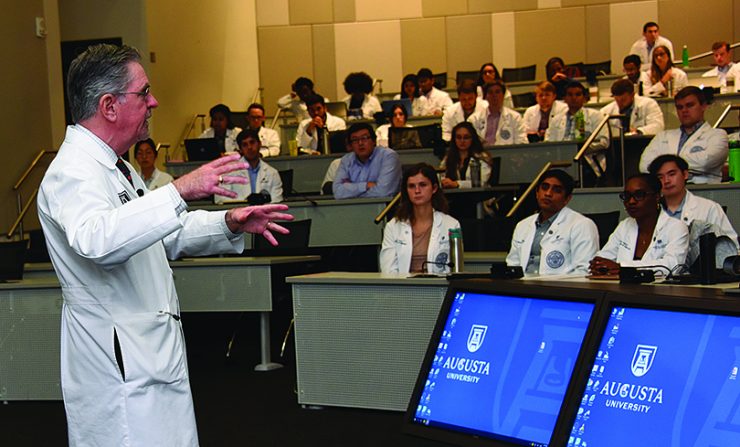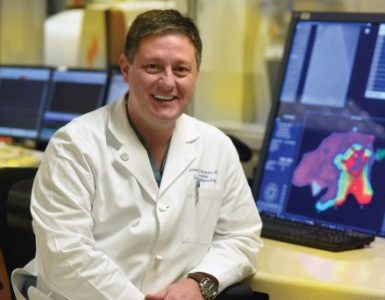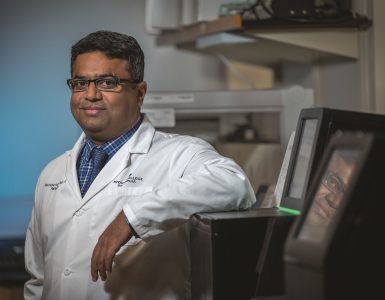Artificial Intelligence
The state’s public medical school is the first in the nation to integrate a course on artificial intelligence for health care into its undergraduate medical curriculum.
Last summer, some 20 first- and second-year medical students, took the novel, five-week “test” module, learning about how “intelligent” machines will impact the future of health care. Next spring, the course, a collaborative effort between MCG and the Augusta University School of Computer and Cyber Sciences and Office of Instructional Design, will become a part of MCG’s MD curriculum.
“As we educate the next generation of physicians, we need to prepare them for the AI insurgency,” says Dr. D. Douglas Miller, vice dean for academic affairs, noting that a recent cover of the Journal of the American Medical Association contained five articles about AI and the future of health care. “The goal is not to make the students experts in computer science or artificial intelligence. The goal is to make them AI literate, so they’ll know what they need to know to practice medicine with the help of machines.”
Artificial intelligence systems can take on many different forms, but AI typically refers to the advanced analytics of big datasets — anything from complex images to genomic information — in search of insights not evident to humans or even standard statistics.
“The systems learn patterns by training on these large sets of data,” Miller explains. “For example, you show a machine 100 chest X-rays, it learns the features, and learns to distinguish a pneumonia from a pulmonary embolus. Once the machine is trained to recognize those features, we give it a new image that it does not recognize. It takes all that machine learning, uses it
to solve the problem and concludes with a high degree of likelihood that it’s a case of pneumonia.”
At MCG, AI is helping physicians better treat patients’ complex cancers.
Dr. Ravindra Kolhe, molecular pathologist and director of the Georgia Esoteric & Molecular Labs LLC in the Department of Pathology, is using IBM Watson to tailor treatment by providing a rapid, comprehensive profile of the genetic mutations at the root of a patient’s specific disease and the therapies that target them (MCG Medicine, Fall 2018/Winter 2019).
“This can speed up care planning and promote cures,” Miller says. “This is a great example of precision medicine through AI.”
It’s important to note, though, that machines, like humans, are capable of mistakes, he says. “Part of preventing those mistakes is building good quality datasets, and we are teaching the students the critical importance of that,” he says. “Humans bring their own biases, but if you want a machine that works, you must train it on good information.”
The new course also covered issues that come along with using AI in health care, like the ethics of using data and machines to affect care. Sitting in front of a patient and telling them they have a certain percent chance of developing a disease requires a level of certainty — knowing how the AI algorithm and dataset are used to predict disease risk is the chief professional responsibility, Miller says.
Students also had a chance to work with real datasets in the university’s IBM Watson Studio platform, which provided hands-on experience.
“It’s clear that health care is going to involve at least narrow applications of AI like medical image reading, pathology slide interpretation and genomics,” Miller says. “Eventually there will be broader AI applications, where machines are autonomously controlling a lot of processes without direct human control. Like the logistics of care delivery in complicated health systems — augmenting humans’ capacity to improve the efficiency of care, reminding them of system faults and eventually modifying the care model.”
MCG receives approval for major MD curriculum redesign
The Medical College of Georgia at Augusta University has received approval from its accrediting body, the Liaison Committee on Medical Education, to officially begin the process of redesigning its four-year core MD curriculum to three years.
The redesign, which should be completed in time for the 2021/22 academic year, paves the way for a more career-tailored fourth year, MCG officials say, with options to enter a primary care residency, spend time honing clinical and research skills or completing a dual degree.
Option 1 in what the medical school has called the MCG 3+ Primary Care Pathway, would see some students graduate in three years, and immediately enter a residency in either family medicine, internal medicine, pediatrics, obstetrics and gynecology or general surgery. Those students would then commit to practicing in an underserved area of the state in exchange for free tuition and/or student loan forgiveness, an aspect of the program that is still dependent on funding.
“We’re looking to the future of medical education. The MCG 3+ Primary Care Pathway is evidence of our commitment to innovation and to better health for rural Georgia,” says Augusta University President Dr. Brooks Keel. “By allowing doctors to complete their medical education and training quicker and with less debt, we’re helping tackle one of Georgia’s most pressing problems and ensuring the future health of all the people who call it home. We need support to do that, and we’re appreciative to our accreditors for giving us theirs.”
“As the state’s only public medical school, it is our duty to ensure a Georgia that is healthier, both physically and economically,” adds MCG Dean Dr. David Hess. “The physician shortage, especially in underserved areas, is a huge problem that’s only going to worsen over time. We know that primary care physicians not only improve a community’s overall health, by preventing and managing chronic conditions on an outpatient basis, but they also bring jobs and other businesses with them. By placing more of these physicians in underserved areas, we’ll be ensuring a healthy future for every corner of our state.”
Another option for students in the new curriculum in the fourth year of medical school is to complete a dual degree program, like the university’s MD/MBA or MD/MPH programs. The final option would allow the majority of students to use the traditional fourth year to participate in advanced clinical training or research in their chosen future career specialty.
“The entire redesign effort is very career focused,” says Dr. D. Douglas Miller, MCG vice dean for academic affairs. “There is a primary care career option; an academic pathway with dual degree options, because we know most students who pursue dual degrees want careers as academic faculty; and there’s an advanced clinical skills training or research option, which gives students time to delve into their chosen specialty and have a much richer fourth-year experience.”
Some changes to the current MD curriculum that students will start experiencing next academic year, which begins July 2020, include adjusting all 7 core clerkships — like those in family medicine and pediatrics, for instance — to a standardized six-week model. In the current curriculum, some clerkships are four weeks, some are six and some are eight. This change will allow clinical clerkship training to be completed in 18 months. Students will also start taking what Miller calls a “single-pass” curriculum in their first and second, basic science-focused years, where abnormal and normal body systems are taught at the same time. There also will be more of a focus on small group, case-based learning (CBL), which pairs a basic scientist and clinician teaching based on real medical cases.
“The curriculum will emphasize the quality of a medical education over its duration, with students progressively achieving competencies, in addition to passing tests,” Miller says. A three-year core curriculum would still provide 130 weeks of instruction, required for accreditation by the LCME.
The changes will require resources, he notes. “We will have to hire additional medical educators, upskill some of our current faculty and reconfigure our learning spaces, because while there will still be classroom lectures, there will be a greater focus on case-based learning, which requires more small group rooms,” he says. “This is one of the most significant curriculum redesign efforts in MCG’s history, but the organization is ready for transformative change. That’s a credit to the support from the dean, Augusta University administration and to the dedication of our faculty and staff to medical education excellence.”
At least a third of U.S. medical schools are considering accelerated tracks, according to a 2016 article in Medical Education Online. The Consortium of Accelerated Medical Pathway Programs, launched in 2015 by eight schools with funding from the Josiah Macy Jr. Foundation, has grown to 16.
 Medical Partnership in Athens expands class size
Medical Partnership in Athens expands class size
By Mary Kathryn Rogers
The Augusta University/University of Georgia Medical Partnership located in Athens is advancing plans to expand its class size from 40 students currently to 60 students in 2021 as part of a broader strategy to address Georgia’s critical shortage of physicians.
“As the state’s only public medical school, we must lead the way in addressing the state’s health care needs,” says Dr. David Hess, MCG dean. “Expanding the class size at the partnership campus in Athens and soon at the main campus in Augusta is one way we are working to ensure Georgia has not only enough doctors to face its growing shortage of physicians, but a healthy economy as well.”
To accommodate the larger class size in Athens, Russell Hall on UGA’s Health Sciences Campus underwent a $3 million renovation last summer. Focused on the student learning experience, the enhancements include a new state-of-the-art simulation suite and clinical skills lab, classroom improvements to allow for active learning, additional small group learning spaces and various types of spaces for studying and collaboration.
The renovation plans included input from faculty, staff and students.
“The growing Medical Partnership on the University of Georgia campus demonstrates the commitment of the state’s flagship public university to serving the people of Georgia,” says S. Jack Hu, UGA’s senior vice president for academic affairs and provost. “From agriculture and engineering to public health and physician education, the University of Georgia is committed to improving the lives of Georgians.”
Of the state’s 159 counties, 63 currently have no pediatrician, 75 have no obstetrician/gynecologist, and eight counties have no doctor at all, according to recent data from the Georgia Board for Health Care Workforce. Georgia also faces a number of health challenges, including high infant mortality rates, high rates of obesity, heart disease and diabetes, and it is consistently ranked among the worst states for health outcomes.
“According to the latest data by the Association of American Medical Colleges, the projections of physician shortages in the United States are anywhere between 47,000 and 122,000 by the year 2032,” says Dr. Michelle Nuss, campus dean at the AU/UGA Medical Partnership. “Our nation’s population is continuing to grow, and we are living longer lives. With this comes an increased need for physicians of all specialties.”
There are currently 40 students per class in the Medical Partnership, and that number will grow to 50 students per class in 2020, then 60 in 2021 and every year thereafter, bringing the total enrollment in Athens to 240 medical students by 2024. In order to provide for the growth of students, the partnership campus plans to add 12 additional faculty members and six additional staff members over the next two years. In Augusta at MCG’s main campus, there are plans to grow the class size from 190 to 240 by 2028, bringing MCG’s total class size to 300 and total enrollment to 1,200.
The planned expansion to 60 students per class in Athens and 240 per class in Augusta was part of the initial recommendation of the 2008 report by the nationally recognized consulting firm Tripp Umbach, which called for an expansion of medical education in Georgia and the establishment of the AU/UGA Medical Partnership campus.
In 2009, MCG and the University of Georgia partnered to create a four-year medical school campus in Athens to grow the number of physicians produced by the state’s only public medical school and help address physician shortages across the state and region. Georgia is already seeing results. Of the 70 Medical Partnership students who have completed their residency training, 25 are currently practicing in Georgia and many of those are practicing in rural parts of the state.
“I am grateful for the support and leadership from the Medical College of Georgia at Augusta University and the University of Georgia, along with our state leaders, to bring the student class expansion and construction project forward,” says Nuss. “I’m also extraordinarily grateful for our community partners.”










